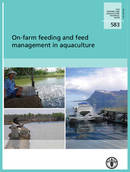Publications
Carrageenan seaweed farming based primarily on the cultivation of Kappaphycus and Eucheuma species has grown significantly in the Philippines and Indonesia in the last two decades. Growth has also taken place on a smaller scale in the United Republic of
Tanzania and a few other developing countries. Thanks to attributes such as relatively simple farming techniques, low requirements of capital and material inputs, and short production cycles, carrageenan seaweed farming has become a favourable livelihood source for smallholder farmers or...
An FAO-sponsored Expert Workshop on Site Selection and Carrying Capacities for Inland and Coastal Aquaculture was held at the Institute of Aquaculture, University of Stirling, the United Kingdom of Great Britain and Northern Ireland, in December 2010. The workshop was attended by 20 internationally recognized experts, including two staff members of FAO, and covered a number of relevant core topics and represented aquaculture in different regions of the world. Expertise within the group included the...
This technical paper provides a comprehensive review of on-farm feeding and feed management practices in aquaculture.
This technical paper provides a comprehensive review of on-farm feeding and feed management practices in aquaculture. It comprises of a) ten case studies on feeding and feed management practices carried out in seven selected countries of Asia and Africa for eight species that belong to four major farmed species of freshwater finfish and shellfish; b) an analysis of the findings...
The article Eat More Fish - A Healthy Alternative, Farmed fish - A Good Choice addresses the pros and cons associated with the consumption of farmed fish in addition to stereotypes of the aquaculture industry.
Article by Jogeir Toppe found in FAO Aquaculture Newsletter.
The document compiles the scientific information collected by the experts for the Joint FAO/IOC/WHO ad hoc Expert Consultation on biotoxins in bivalve molluscs held in Oslo, Norway, 26–30 September 2004 to answer the request of scientific advice expressed by the Codex Committee for Fish and Fishery Products (CCFFP). In order to satisfy the many requests received by FAO to disseminate the information collected over these years since 2004, the data and information available were edited...






